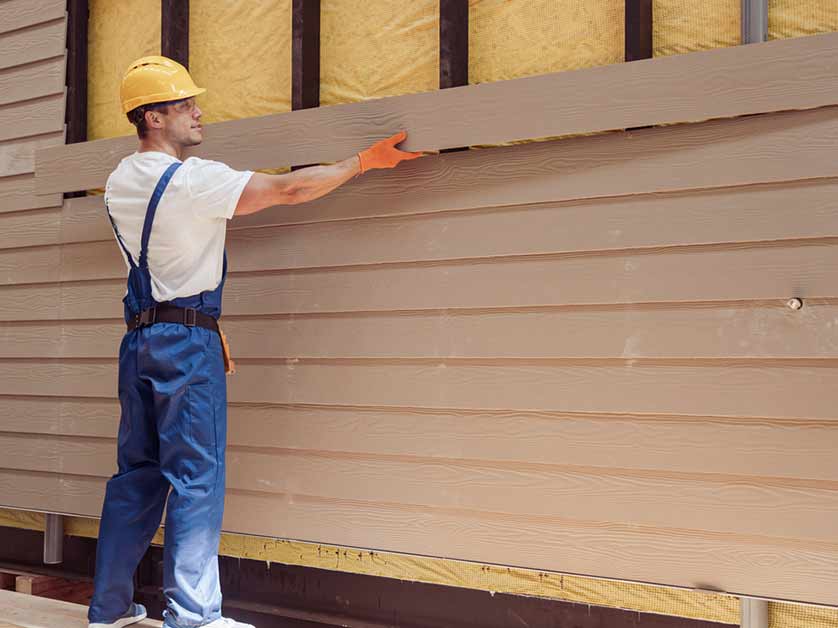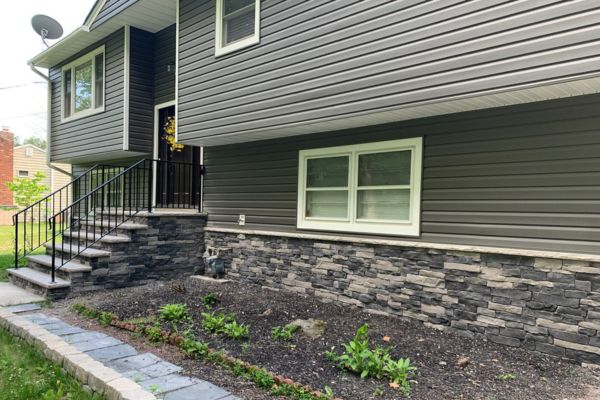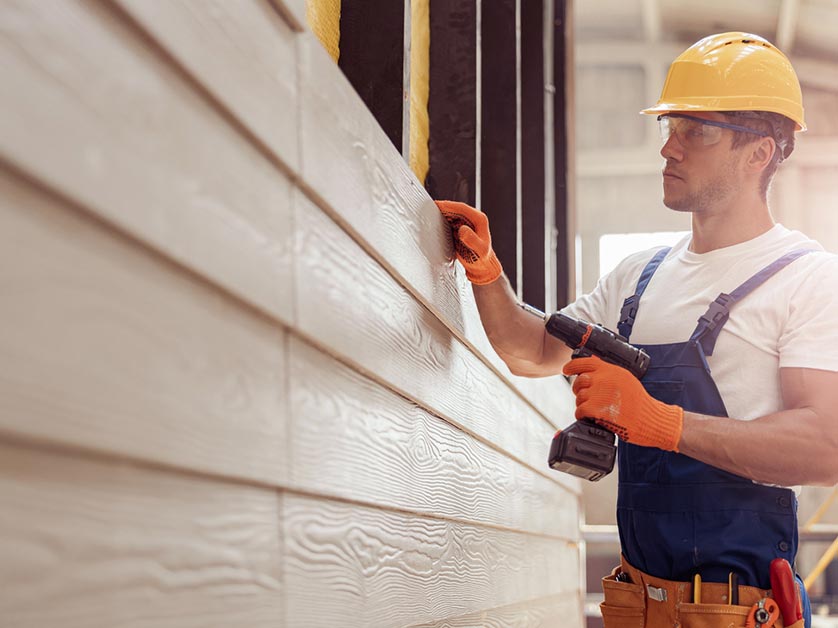Professional Morris Siding Contractor Offering Quick and Efficient Service
Professional Morris Siding Contractor Offering Quick and Efficient Service
Blog Article
The Essential Guide to the Numerous Sorts Of Exterior Siding and Their Unique Benefits
In the realm of home improvement, picking the right exterior siding is a critical decision that influences both visual appeal and useful efficiency. With so lots of options to consider, which house siding product genuinely stands out for your specific task?
Wood Home Siding
Wood house siding, a popular selection for domestic exteriors, supplies an ageless visual that incorporates all-natural beauty with structural stability. This house siding product is readily available in different styles, including clapboard, roof shingles, and board-and-batten, enabling homeowners to personalize their façade to match their layout preferences. Timber siding is usually crafted from sturdy types such as cedar, redwood, or want, which are recognized for their strength and capability to endure ecological stress factors.
Among the main benefits of wood home siding is its exceptional insulation residential properties, which can add to power effectiveness and reduced home heating prices. Additionally, wood siding is naturally degradable, making it an eco-friendly option when sourced sustainably. Regular upkeep, consisting of paint or discoloration, can prolong its life expectancy and improve its look, permitting property owners to protect the all-natural charm of the timber.
Nonetheless, prospective disadvantages consist of sensitivity to insects, rot, and weather damage, necessitating ample treatment and maintenance - morris siding contractor. Regardless of these worries, when effectively looked after, timber home siding can provide a durable and attractive solution that enhances the personality of a home while using a cozy, inviting environment

Vinyl Exterior Siding
Plastic home siding has emerged as a leading option for homeowners looking for a low-maintenance outside option that incorporates resilience and cost. This versatile material is crafted from polyvinyl chloride (PVC), making it resistant to numerous weather conditions, consisting of dampness and UV rays. Consequently, vinyl home siding does not warp, rot, or fade, making sure long-lasting visual appeal.
Among the main advantages of vinyl siding is its comprehensive series of colors and designs, allowing house owners to attain the desired appearance for their property without the need for regular repainting. In addition, plastic siding is simple to set up, which can dramatically decrease labor costs throughout building or improvement tasks.
Vinyl siding additionally adds to power effectiveness. Many alternatives feature insulation support, which improves thermal efficiency, aiding to keep comfortable interior temperatures and possibly decreasing power bills. Its smooth surface area facilitates simple cleansing, needing just periodic washing with a garden hose to remove dirt and particles.
Fiber Concrete Home Siding
Fiber cement house siding has gotten traction amongst home owners and home builders alike due to its remarkable combination of durability and aesthetic versatility. Composed of a combination of sand, cellulose, and cement fibers, this home siding option is engineered to endure extreme weather, consisting of high winds, heavy rain, and temperature level fluctuations, making it a long-lasting selection for residential exteriors.

Among the primary advantages of fiber concrete house siding is its resistance to parasites, such as termites, and its non-combustible nature, offering boosted fire security. morris siding contractor. Furthermore, it is offered in a vast range of colors, designs, and textures, allowing home owners to attain their wanted aesthetic without compromising performance
Another benefit is its reduced upkeep needs; fiber concrete home siding typically requires paint or staining every 5-10 years, which is less constant than other materials. Its long life contributes to a reduced overall price of ownership, as it lowers the need for constant repairs or replacements.
Inevitably, fiber concrete exterior siding represents a superb investment for those looking for a durable, appealing, and flexible outside choice, integrating both kind and look at here function to improve the home's aesthetic charm.
Metal House Siding
The attraction of steel house siding exists in its durable toughness and modern-day visual charm, making it a preferred choice for contemporary style. Readily available in products such as light weight aluminum and steel, steel exterior siding provides a range of finishes and shades, allowing homeowners to attain a tailored appearance that complements their design vision.

Energy efficiency is another significant advantage, as numerous metal exterior siding products are developed with insulation choices that assist control indoor temperatures. This can lead to lowered energy prices with time. In addition, steel home siding is commonly recyclable, making it an ecologically friendly option for sustainability-minded house owners.
The setup process for metal house siding can be reasonably simple, resulting in a quicker turnaround time for building projects. Overall, steel home siding integrates functionality and design, making it a functional choice for those seeking a aesthetically attractive and long-lasting exterior surface.
Brick and Stone Home Siding
Block and stone home siding stands apart as a anonymous timeless choice that enhances the visual appeal of any home. Recognized for their longevity and reduced maintenance, these products provide a remarkable roi while raising the property's visual allure. Offered in various colors, appearances, and patterns, brick and rock can be tailored to fit varied architectural styles, from typical to contemporary.
Among the key benefits of brick and stone house siding is their energy effectiveness. Both products have all-natural insulating buildings that assist manage indoor temperatures, potentially lowering heating & cooling costs. Furthermore, they supply exceptional fire resistance compared to other home siding alternatives, adding to boosted safety.
Another benefit is their durability. Brick and stone can last for decades, commonly calling for marginal maintenance past periodic cleansing. Unlike wood siding, they are unsusceptible insects and rot, guaranteeing a lasting exterior that endures the aspects.
Final Thought
In recap, the choice of home siding dramatically influences a home's visual charm, energy efficiency, and maintenance requirements. Each kind of house siding-- whether timber, plastic, fiber steel, cement, or brick and stone-- offers unique benefits customized to numerous home owner choices and ecological problems. Comprehending these choices allows informed choices that improve both the toughness and visual charm of household exteriors. Eventually, choosing the right house siding he has a good point is crucial for accomplishing a balance in between functionality and layout in domestic architecture.
One of the main advantages of wood house siding is its outstanding insulation residential properties, which can contribute to energy performance and lower home heating costs. Furthermore, timber exterior siding is eco-friendly, making it an environmentally friendly choice when sourced sustainably.One of the key benefits of steel exterior siding is its resistance to numerous ecological factors.Energy effectiveness is an additional significant advantage, as lots of metal house siding products are created with insulation alternatives that help regulate indoor temperatures. Each kind of exterior siding-- whether timber, plastic, fiber metal, cement, or brick and rock-- supplies unique benefits tailored to various property owner preferences and environmental conditions.
Report this page